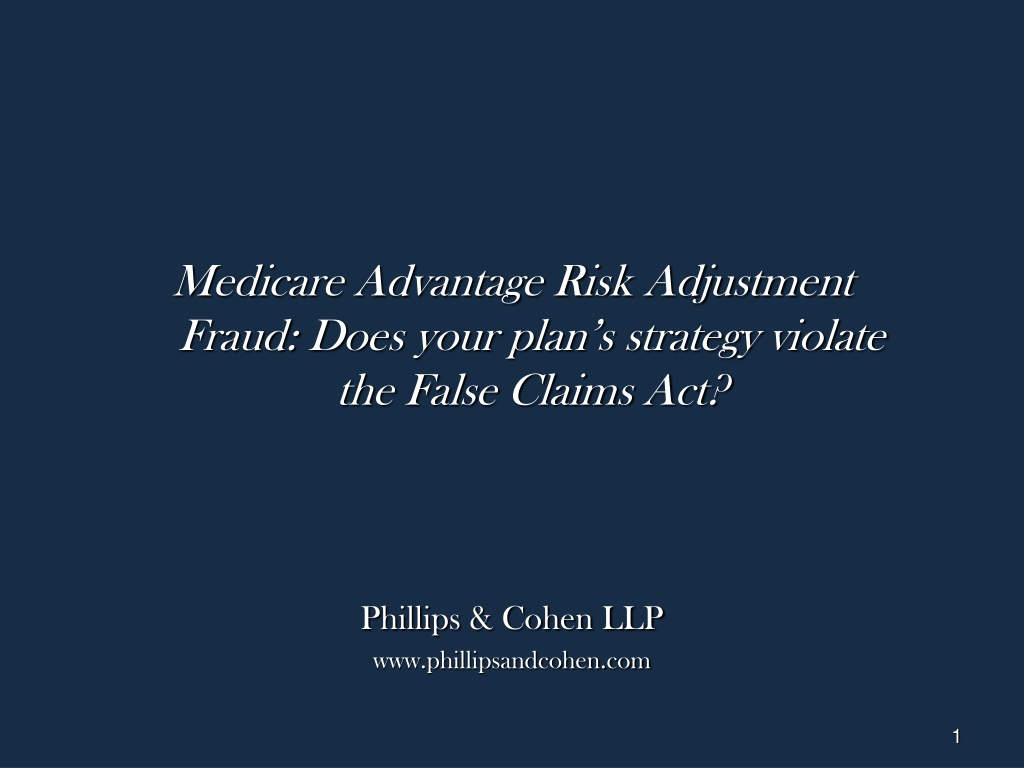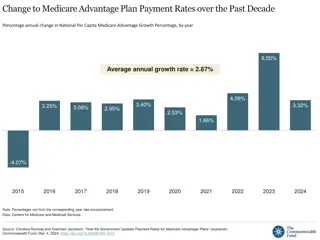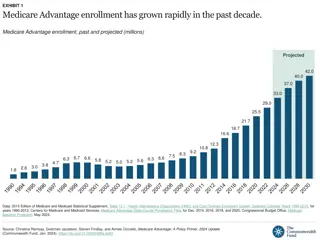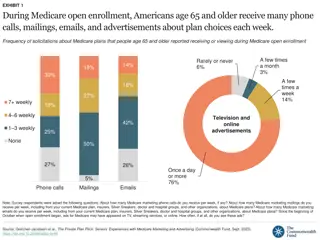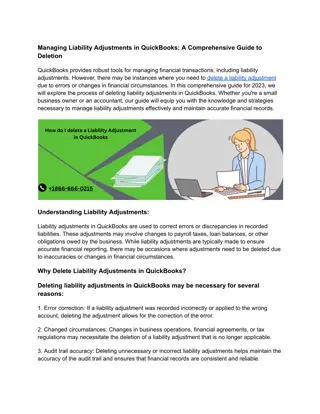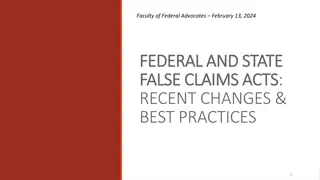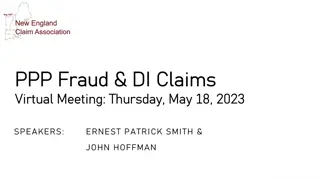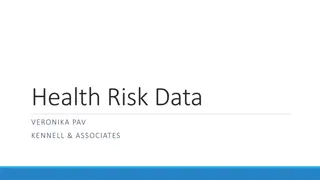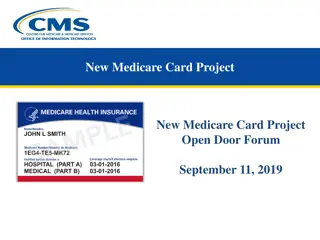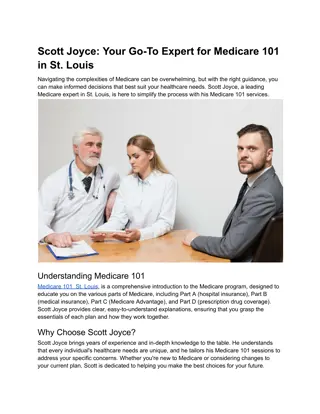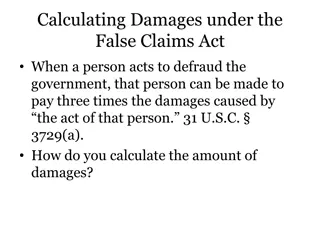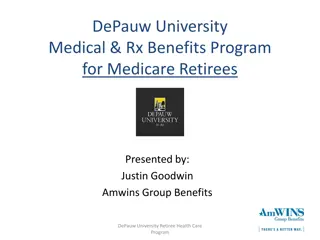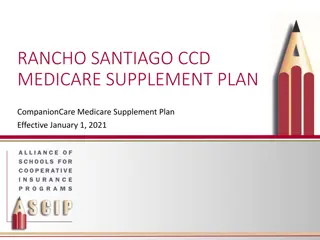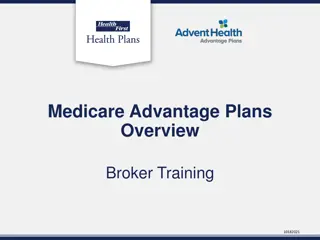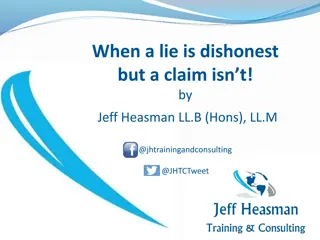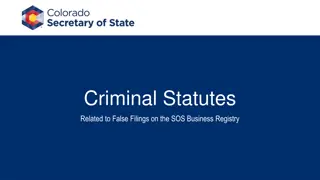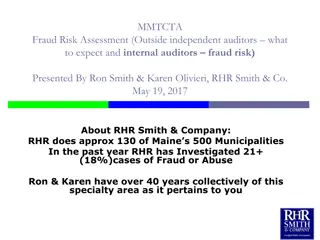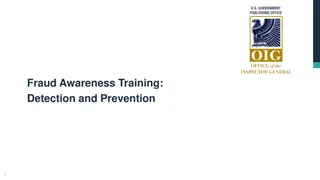Medicare Advantage Risk Adjustment Fraud and False Claims Act Violation
Risk adjustment fraud in Medicare Advantage involves upcoding for diagnosis codes, leading to fraudulent claims. This scheme impacts the payment system by inflating costs through false diagnoses. By exploiting the capitated payment model, some organizations may engage in activities that potentially violate the False Claims Act.
Download Presentation

Please find below an Image/Link to download the presentation.
The content on the website is provided AS IS for your information and personal use only. It may not be sold, licensed, or shared on other websites without obtaining consent from the author. Download presentation by click this link. If you encounter any issues during the download, it is possible that the publisher has removed the file from their server.
E N D
Presentation Transcript
Medicare Advantage Risk Adjustment Fraud: Does your plan s strategy violate the False Claims Act? Phillips & Cohen LLP www.phillipsandcohen.com 1
Overview of Risk Adjustment Fraud Risk adjustment fraud is essentially upcoding for diagnosis codes Traditional Upcoding: doctors and hospitals, paid by the procedure, claim payment for procedures they did not truly perform, or for a more complex version of the procedure they did perform Risk Adjustment Upcoding: Medicare Advantage ( MA ) HMOs, paid in large part by their members health status, claim payment for diagnoses they do not have/were not treated for PHILLIPS & COHEN LLP www.phillipsandcohen.com 2
Principles of Risk Adjustment PHILLIPS & COHEN LLP www.phillipsandcohen.com 3
Principles of Risk Adjustment CMS pays Medicare Advantage HMOs on a capitated basis Per-member-per-month CMS recognizes, however, the risk HMOs take by agreeing to insure beneficiaries for a flat monthly fee A single hospitalization costs an average of $10,000 and can wipe out the Medicare premiums the HMO received that year PHILLIPS & COHEN LLP www.phillipsandcohen.com 4
Principles of Risk Adjustment To help HMOs manage their risk, CMS created a system that increases its premium for beneficiaries who are receiving treatment for diseases that typically correspond to high costs The additional money comes in the form of an increased capitation rate: Member s Capitation Rate = (The HMO s Base Capitation Rate) x (The Member s Risk Adjustment Multiplier) PHILLIPS & COHEN LLP www.phillipsandcohen.com 5
Example: 76-year-old female with diabetes and renal failure Condition HCC Adjustment Female, 76 0.468 Diabetes (no complications) 19 0.162 Renal failure 131 0.368 Total 0.998 Base PMPM $800 Multiplier 0.998 Adjusted PMPM $798.4 PHILLIPS & COHEN LLP www.phillipsandcohen.com 6
Requirements for Risk Adjustment Claims The patient must have been treated that year Face-to-face By a qualifying provider PHILLIPS & COHEN LLP www.phillipsandcohen.com 7
Requirements for Risk Adjustment Claims CMS has rigid requirements about how plans qualify for increased risk adjustment payments The diagnosis codes must be documented in the medical record, following standard industry guidelines (ICD-9-CM) The diagnosis codes must stem from a face-to-face encounter between the physician and the patient PHILLIPS & COHEN LLP www.phillipsandcohen.com 8
Requirements for Risk Adjustment Claims To ensure these goals are met, CMS requires HMOs to follow its guidance as to what diagnosis codes they submit For example: HMOs cannot submit diagnosis codes taken from certain types of medical records, such as radiology and lab reports, because the records do not reflect a face-to-face physician encounter PHILLIPS & COHEN LLP www.phillipsandcohen.com 9
Risk Adjustment Fraud and the False Claims Act PHILLIPS & COHEN LLP www.phillipsandcohen.com 10
Risk Adjustment and the False Claims Act The False Claims Act prohibits: knowingly presenting (or causing to be presented) to the federal government a false or fraudulent claim for payment or approval; and knowingly concealing or knowingly and improperly avoiding or decreasing an obligation to pay or transmit money or property to the Government. 31 U.S.C. 3729(a)(1). a) b) PHILLIPS & COHEN LLP www.phillipsandcohen.com 11
Risk Adjustment and the False Claims Act Any person who violates the FCA is liable for a civil penalty of up to $11,000 for each violation, plus three times the amount of the damages sustained by the United States. 31 U.S.C. 3729(a)(1). PHILLIPS & COHEN LLP www.phillipsandcohen.com 12
Each Diagnosis Submitted to CMS is a Claim for Payment With every diagnosis, HMOs submit information to CMS asserting the member has the diagnosed condition and received treatment for it: The member s Health Insurance Claim ( HIC ) number The ICD-9-CM diagnosis code The service from date and service through date The provider type PHILLIPS & COHEN LLP www.phillipsandcohen.com 13
Risk Adjustment and the False Claims Act Each risk adjustment claim is itself a false statement, if the diagnosis is unsupported No separate certification is required to establish falsity That being said . . . PHILLIPS & COHEN LLP www.phillipsandcohen.com 14
Medicare Advantage HMOs must attest to the accuracy of their risk adjustment data on an annual basis. 15
United States v. Janke PHILLIPS & COHEN LLP www.phillipsandcohen.com 16
United States v. Janke, 09-CV-14044-Moore-Lynch (S.D. Fla. Feb. 10, 2009) Settled for $22.6 million in November 2010 17
United States v. Janke MA plan used coding reviewers to submit diagnosis codes to CMS that were not documented in the medical record or supported by an actual medical condition Data sweeps to find additional codes MA plan submitted codes via an automated system that could not delete unsupported or false claims Example: reviewers are unable to submit delete codes when they find erroneous data (there is an add function, though) PHILLIPS & COHEN LLP www.phillipsandcohen.com 18
United States v. Janke, 09-CV-14044-Moore-Lynch (S.D. Fla. Feb. 10, 2009) CMS Extrapolated Audit Results to Assess Damages from Risk Adjustment Fraud 19
Pending Unsealed Cases Involving Medicare Advantage Plans and Risk Adjustment Fraud PHILLIPS & COHEN LLP www.phillipsandcohen.com 20
Pending unsealed cases United States ex rel. Valdez v. Aveta, Inc. et al., No. 3:15cv1140 (D. P.R.) The complaint alleges that MA plans submitted inflated Risk Adjustment Factor scores based on diagnosis codes reported by Puerto Rican physicians and hospitals. The complaint alleges that risk scores were unsupported by the patients medical records. PHILLIPS & COHEN LLP www.phillipsandcohen.com 21
Pending unsealed cases United States ex rel. ex rel. Graves v. Plaza Medical Centers, et al., No. 8:13cv1348 (C.D. Cal.) In a recent ruling on a motion to dismiss, the district court upheld a magistrate judge s opinion holding that a doctor systematically upcoded patient diagnoses to increase their risk adjustment factors, and a MA plan knowingly failed to correct the issues despite audits of patient files. PHILLIPS & COHEN LLP www.phillipsandcohen.com 22
Pending unsealed cases United States ex rel. Silingo, et al., v. Mobile Medical Examination Services Inc., et al., No. 1:10cv23382 (S.D. Fla.)) The complaint alleges that defendant Mobile Medical Examination Services systematically upcoded patients to increase their risk scores without performing a face-to-face evaluation under the supervision of a physician. Health plans then turned a blind eye to the truth and failed to properly certify or validate the claims submitted by Mobile Medical Examination Services. PHILLIPS & COHEN LLP www.phillipsandcohen.com 23
Pending unsealed cases United States ex rel. Conte v. Blue Cross Blue Shield of South Carolina, et al., No. 3:13-cv-2251-CMC (D. S.C.) Due to a critical and fatal coding error, the Complaint alleges that procedure codes submitted to CMS by the defendants were inaccurate and unverifiable. According to the whistleblowers, the defendants were alerted to the coding errors and in fact forced them to stop submitting inaccurate, unverifiable false claims to the government, but the defendants refused to correct previous false claims submitted to the government and retaliated against one whistleblower. PHILLIPS & COHEN LLP www.phillipsandcohen.com 24
Pending unsealed cases United States ex rel. Ledesma v. Censeo Health LLC, et al., No. 3:14-CV-0118-M (N.D. Tx.) The Complaint alleges that the defendant developed an algorithm to identify patients who previously suffered from conditions that would increase their risk- adjusted capitation payments and sends physicians to conduct "in home assessments" of these patients, then submits the old diagnoses to CMS. These visits usually did not result in any follow-up care, but were rather exclusively to increase risk adjustment scores. These in-home assessments are, according to the whistleblower, not valid assessments but rather self-reported conditions captured from the medical history and verbally confirmed by the physician. Such assessments cannot form the basis for higher risk scores. The complaint also alleges that many of the physicians were not licensed to practice medicine. PHILLIPS & COHEN LLP www.phillipsandcohen.com 25
Pending unsealed cases United States ex rel. Valdez v. Aveta, Inc. et al., No. 3:15cv1140 (D. P.R.) The complaint alleges that MA plans submitted inflated Risk Adjustment Factor scores based on diagnosis codes reported by Puerto Rican physicians and hospitals. The complaint also alleges that risk scores were unsupported by the patients medical records. PHILLIPS & COHEN LLP www.phillipsandcohen.com 26
Areas of Risk for the Submission of False Risk Adjustment Claims PHILLIPS & COHEN LLP www.phillipsandcohen.com 27
Causes of False Claims: Affirmative Upcoding 1. 2. Simple fraud making it up Exaggerating severity of patient s condition (e.g., depression, malnutrition) Claiming current treatment of condition (e.g., stroke, cancer) instead of past history of treatment Claims based on laboratory, radiology or other improper provider or service type Improperly linking complications and conditions 3. 4. 5. PHILLIPS & COHEN LLP www.phillipsandcohen.com 28
Causes of False Claims: Business Practices and Systemic Causes of Falsity Conducting chart reviews or other audits that only look for new risk adjustment claims Failure to properly filter data used to generate risk adjustment claims Compliance risk due to incentives to providers and failure to monitor provider submissions Compliance risk due to vendor business methods and incentives 1. 2. 3. 4. PHILLIPS & COHEN LLP www.phillipsandcohen.com 29
